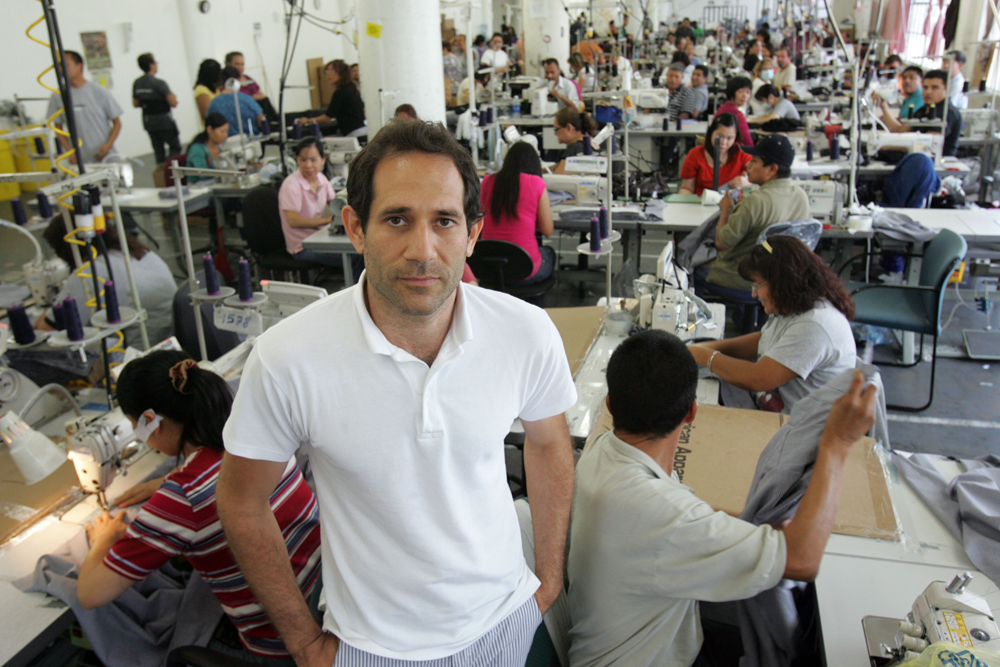As I discussed last week, Dov Charney got booted from his American Apparel CEO position for alleged misconduct. He’s a creeper with the same aesthetic as Terry Richardson, which is evidenced by the scads of his NSFW ads not fit to print here. Charney has already demanded his position back and threatened a lawsuit. American Apparel’s co-Chairman, Allan Mayer, has stated, “We’re very confident that we are on very firm legal ground. We continue to believe firmly that we did the right thing, for the right reasons, in the right way.”
What did Charney do to get fired? The wild stories about him have persisted for years. Several of his employees have unsuccessfully tried to sue him for sexual harassment. He’s notorious for creating a hostile work environment, and he pleasures himself in front of journos. After all these years of documented misconduct, what could be bad enough that American Apparel would finally oust him?
A few possible reasons have surfaced since Charney got the boot. The first is a bizarre naked dancing video where Charney gyrates for two female employees. The second reason is even more disturbing and relates to 2011 allegations that Charney forced a teenage employee to become his sex slave. The NYPost article about what this girl went through is both graphic and disturbing. Those allegations were tied up in court for years. Charney eventually settled with the woman, Erica Morales, for a six-figure sum. The American Apparel board has broken its silence to the NYPost about this incident (and a few others):
American Apparel moved to fire CEO Dov Charney over allegations related to the 2011 case of Irene Morales, a former employee who accused him of making her his “sex slave,” The Post has learned.
The clothing retailer’s board, which said in a public statement earlier this week that it was investigating unspecified “alleged misconduct,” resurrected the case in its surprise move to fire Charney at a Wednesday meeting, sources said.
Specifically, the board this week accused Charney of allowing an employee at the Los Angeles clothing chain to post nude photos of Morales on a blog that was purportedly authored by Morales, insiders said.
The board’s concern, according to sources, is that the blog not only harassed and defamed Morales, but also ran afoul of certain California laws that forbid falsely impersonating others online, as alleged in a suit at the time by Morales’s lawyer Eric Baum. By knowingly allowing the blog to be posted, the board charged that Charney exposed the company to liability, according to sources close to the situation.
The lawsuit brought by Morales, who had sought $260 million, was thrown out by a Brooklyn judge in 2012 and sent into arbitration. The suit appeared to have been complicated after The Post revealed in an exclusive March 25, 2011, report that Morales had allegedly sent dozens of nude photos of herself to Charney after she stopped working for American Apparel, coupling them with saucy come-ons.
“Daddy’s got a little naughty girl waiting for him,” Morales allegedly wrote, according to Charney’s lawyer Stuart Slotnick. This spring, however, the blog postings became a key sticking point in settlement talks, exposing American Apparel to damages, according to sources.
According to one source, a settlement was recently in the works for a dollar sum “in the low six-digits,” well short of the judgement Morales had sought. It wasn’t immediately clear whether a settlement has been finalized.
Nevertheless, the case has come back to haunt Charney, who was abruptly stripped of his chairman title and suspended from his CEO post for 30 days, pending a permanent ouster following the Wednesday board meeting in New York.
Reached Friday, American Apparel co-chairman Allen Mayer declined to discuss specifics of Charney’s alleged misconduct, but did say the board recently got new information that spurred the surprise coup.
“We have heard for years allegations and rumors in newspaper stories that were not sufficient to take action,” Mayer told The Post. “But what came to our attention was not allegations and rumors but established fact.”
The board also raised concerns about certain severance payments to former female employees that were authorized by Charney without the board’s consent, according to sources close to the case.
[From NY Post]
It sounds like several former employees were paid off by Charney, and god only knows what he did to them. Of course Charney tried to defend himself against sex-slave claims by saying the girl came onto him. That’s such a Terry Richardson move. Thank goodness American Apparel finally came to their senses and got rid of Dov Charney.
Photos courtesy of NY Mag & Getty













Yukkk
Yeah, just gross.
I like your name by the way😁
He sooooooooooo looks the part of a pervert. He needs to go behind bars and find out what real perversion feels like.
Don’t hold your breath on any punishment for this a-hole. America isn’t really known for it’s record on putting rich perverts in jail.
someone needs to Lorena Bobbitt that d-lord – that would prob be a worse punishment for him than jail
What a disgustingly vile human being.
Wait, is her name Erica or Irene?
And he even kinda looks like Uncle Terry. Shudder.
Grosssss
jesushchrist. beyond awful.
I think I need to vomit …
Even worse is that while he may lose his job, he will still be a bazillionaire and not go to jail ….
Disgusting. Someone should have done something much earlier. Goes to show you how power and money can create such an intimidating atmosphere.
Exactly! As long as he was making money, they kept settling his law suits and looking the other way. The whole company is guilty – or should be!
Why do perverts always wear THOSE kind of glasses?!!???!!1!1!1
You’re so right! What IS that all about??
Another aspect of this situation that is infuriating is how companies protect those in top management positions. According an article by the New York Times, the AA board offered Dov the “… opportunity to remain at the company as a consultant in a creative role, so long as he resigned … ” as CEO. His pay? 4 million. What?! This is completely immoral and a total rip off of the stock holders. This is all too common with CEO’s who are fired. They need to be stripped of ALL monies and benefits when there is such gross, and criminal misconduct.
You know, he does a good job in that position and they’re probably scared of the uncertainty.
that second photo is gross, great choice to accompany this article. yuck. lol
Awaiting my new copy of NY Mag with the cover story titled, “Charney – Retail genius or sexual predator?”
The company’s story is bull. Those images were out years ago – you can still totally find them. The more correct version of events, I suspect, was that the company is looking to bring in some outside money for an infusion of capital and investors were scared off by his behavior and prediliction for getting the company sued (not just for sex stuff – they also had to pay out to Woody Allen for nonconsensual use of his image). Corporations will tolerate a ton of stuff, but they rarely tolerate touching the money.
I remember hearing complaints and stories about him for years now. It’s because of him that I won’t but American Apparel clothing. He disgusts me and I refuse to give his company any of my money.
That’s my question. Why is this guy in prison?
There’s going to be a lot of happy employees now that he’s fired. But it means nothing if they bring in someone just as awful for their next CEO. And would the next CEO still continue with those creepy, nasty ads, or is that AA’s thing?
Let’s be clear that the powers-that-be at American Apparel aren’t acting on conscience, they’ve gotten rid of him because he’s costing them money. They knew eons ago what kind of man he was. Please. Big business doesn’t care about people; they couldn’t be big business if they did.
Sadly Denise,
I think that you are right.
Bingo. The stock has gone from in the high 60.00’s to somewhere around .29 cents a share… that’s what this is about.